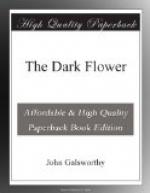She got up and began to dress for dinner. Standing before her glass she was surprised to see that her face showed no signs of the fears and doubts that were now her comrades. Was it because, whatever happened, she loved and was beloved! She wondered how she had looked when he kissed her so passionately; had she shown her joy before she checked him?
In her garden by the river were certain flowers that, for all her care, would grow rank and of the wrong colour—wanting a different soil. Was she, then, like those flowers of hers? Ah! Let her but have her true soil, and she would grow straight and true enough!
Then in the doorway she saw her husband. She had never, till to-day, quite hated him; but now she did, with a real blind horrible feeling. What did he want of her standing there with those eyes fixed on her—those forceful eyes, touched with blood, that seemed at once to threaten, covet, and beseech! She drew her wrapper close round her shoulders. At that he came up and said:
“Look at me, Olive!”
Against instinct and will she obeyed, and he went on:
“Be careful! I say, be careful!”
Then he took her by the shoulders, and raised her up to him. And, quite unnerved, she stood without resisting.
“I want you,” he said; “I mean to keep you.”
Then, suddenly letting her go, he covered his eyes with his hands. That frightened her most—it was so unlike him. Not till now had she understood between what terrifying forces she was balancing. She did not speak, but her face grew white. From behind those hands he uttered a sound, not quite like a human noise, turned sharply, and went out. She dropped back into the chair before her mirror, overcome by the most singular feeling she had ever known; as if she had lost everything, even her love for Lennan, and her longing for his love. What was it all worth, what was anything worth in a world like this? All was loathsome, herself loathsome! All was a void! Hateful, hateful, hateful! It was like having no heart at all! And that same evening, when her husband had gone down to the House, she wrote to Lennan:
“Our love must never turn to earthiness as it might have this afternoon. Everything is black and hopeless. He suspects. For you to come here is impossible, and too dreadful for us both. And I have no right to ask you to be furtive, I can’t bear to think of you like that, and I can’t bear it myself. I don’t know what to do or say. Don’t try to see me yet. I must have time, I must think.”
XIII
Colonel Ercott was not a racing man, but he had in common with others of his countrymen a religious feeling in the matter of the Derby. His remembrances of it went back to early youth, for he had been born and brought up almost within sound of the coaching-road to Epsom. Every Derby and Oaks day he had gone out on his pony to watch the passing of the tall hats and feathers of the great, and the pot-hats and feathers of the lowly; and afterwards, in the fields at home, had ridden races with old Lindsay, finishing between a cow that judged and a clump of bulrushes representing the Grand Stand.




